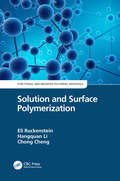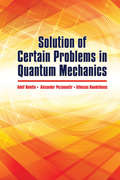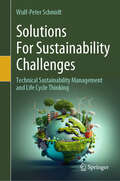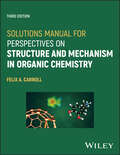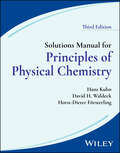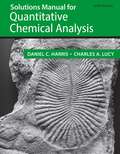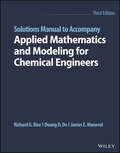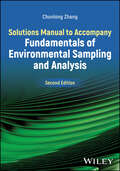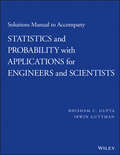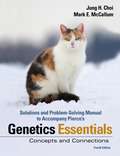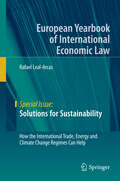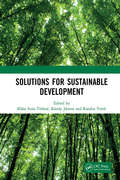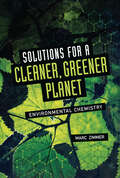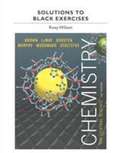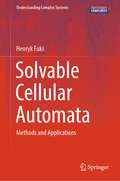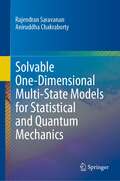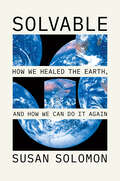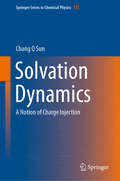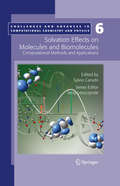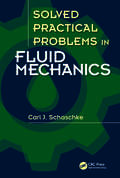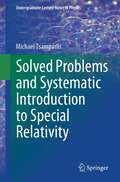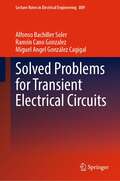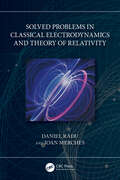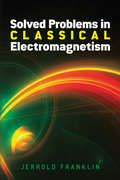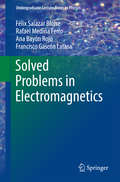- Table View
- List View
Solution and Surface Polymerization
by Eli Ruckenstein, Hangquan Li and Chong ChengComprising one volume of Functional and Modified Polymeric Materials, Two-Volume Set, this well-organized collection of papers by Professor Eli Ruckenstein and co-workers focuses on functional and modified polymeric materials prepared mainly through solution polymerization and surface polymerization. Although solution polymerization has been broadly utilized for the preparation of polymeric materials, the book shows significant approaches to special classes of polymeric materials including functional polymers by living ionic polymerization, degradable and decrosslinkable polymers, semi- and interpenetrating polymer network pervaporation membranes, and soluble conducting polymers. It also focuses on preparing and modifying conductive surface of polymer or polymer-based materials.
Solution of Certain Problems in Quantum Mechanics (Dover Books on Physics)
by A. Bolotin A. Pozamantir A. RaudeliunasIntended for advanced undergraduates and graduate students in mathematics, physics, and chemistry, this work teaches problem-solving using the theory of special functions. The concise treatment presents the theory methodically and in detail to a wide variety of problems in atomic and molecular physics. The overall applicability of this method and its extension to solving these problems are discussed with attention to detail seldom found in textbooks of this level.Starting with a brief introduction to the hypergeometric equations and their properties, a step-by-step method consisting of six distinct parts illustrates how to address typical problems in quantum physics in a simple and uniform fashion. This technique can also be applied to the solution of other problems, for which the Schrödinger equation can be reduced by some means to an equation of the hypergeometric type. Topics include the discrete spectrum eigenfunctions, linear harmonic oscillators, Kratzer molecular potential, and the rotational correction to the Morse formula. The text concludes with an Appendix that presents an original Fourier transform-based method for converting multicenter integrals to a single center.
Solutions For Sustainability Challenges: Technical Sustainability Management and Life Cycle Thinking
by Wulf-Peter SchmidtThe book is intended as a primary resource for Chief Sustainability Officers (CSOs), all professionals with interest in sustainability as well as sustainability courses at CBS International Business School and other universities. It starts by reviewing the challenges of sustainability (environmental, social, economic, and governance). The basics of life cycle thinking are explained, looking at Life Cycle Assessment/LCA, Life Cycle Costing/LCC, Social LCAs, and Life Cycle Management. These are applied to sustainable strategy development, sustainable product development, sustainable supply chain management and logistics, sustainable production, sustainable consumption, circular economy, sustainable digitalization, sustainable finance, sustainable employee relations, sustainable advocacy, law and policymaking, etc.—to show how each person in each profession and role can act sustainably and how to democratize sustainability.
Solutions Manual for Perspectives on Structure and Mechanism in Organic Chemistry
by Felix A. CarrollSOLUTIONS MANUAL FOR PERSPECTIVES ON STRUCTURE AND MECHANISM IN ORGANIC CHEMISTRY Based on the author’s first-hand classroom experience, this solutions manual complements the 3rd edition of Perspectives on Structure and Mechanism in Organic Chemistry. The solutions to the 438 textbook problems help students increase their understanding of physical organic chemistry, and more than 550 references stimulate their engagement with the chemical literature.
Solutions Manual for Principles of Physical Chemistry, 3rd Edition, Solutions Manual
by Hans Kuhn Horst-Dieter Försterling David H. WaldeckThis is a Solutions Manual to Accompany with solutions to the exercises in the main volume of Principles of Physical Chemistry, Third Edition. This book provides a unique approach to introduce undergraduate students to the concepts and methods of physical chemistry, which are the foundational principles of Chemistry. The book introduces the student to the principles underlying the essential sub-fields of quantum mechanics, atomic and molecular structure, atomic and molecular spectroscopy, statistical thermodynamics, classical thermodynamics, solutions and equilibria, electrochemistry, kinetics and reaction dynamics, macromolecules, and organized molecular assemblies. Importantly, the book develops and applies these principles to supramolecular assemblies and supramolecular machines, with many examples from biology and nanoscience. In this way, the book helps the student to see the frontier of modern physical chemistry developments. The book begins with a discussion of wave-particle duality and proceeds systematically to more complex chemical systems in order to relate the story of physical chemistry in an intellectually coherent manner. The topics are organized to correspond with those typically given in each of a two course semester sequence. The first 13 chapters present quantum mechanics and spectroscopy to describe and predict the structure of matter: atoms, molecules, and solids. Chapters 14 to 29 present statistical thermodynamics and kinetics and applies their principles to understanding equilibria, chemical transformations, macromolecular properties and supramolecular machines. Each chapter of the book begins with a simplified view of a topic and evolves to more rigorous description, in order to provide the student (and instructor) flexibility to choose the level of rigor and detail that suits them best. The textbook treats important new directions in physical chemistry research, including chapters on macromolecules, principles of interfaces and films for organizing matter, and supramolecular machines -- as well as including discussions of modern nanoscience, spectroscopy, and reaction dynamics throughout the text.
Solutions Manual for Quantitative Chemical Analysis
by Daniel C. Harris Charles A. LucyThe 10th edition of Quantitative Chemical Analysis continues to set the standard for learning analytical chemistry with distinguished writing, the most up-to-date content, and now the acclaimed SaplingPlus program, supporting exceptional problem solving practice. New author Charles Lucy joins Dan Harris, infusing additional subject expertise and classroom experience into the 10th edition.
Solutions Manual to Accompany Applied Mathematics and Modeling for Chemical Engineers
by Duong D. Do Richard G. Rice James E. ManevalThis book is a Solutions Manual to accompany Applied Mathematics and Modeling for Chemical Engineers, Third Edition. There are many examples provided as homework in the original text and the solution manual provides detailed solutions of many of these problems that are in the parent book Applied Mathematics and Modeling for Chemical Engineers, Third Edition.
Solutions Manual to Accompany Fundamentals of Environmental Sampling and Analysis
by Chunlong ZhangThis is the Solutions Manual to accompany Fundamentals of Environmental Sampling and Analysis, Second Edition. It provides solutions to the exercises and problems found in the main volume This book introduces a comprehensive overview on the fundamentals and applications of environmental sampling and analysis for students in environmental science and engineering as well as environmental professionals involved in sampling and analytical work. The book details fundamentals of sampling, selection of standard methods, QA/QC, sample preparation, chemical and instrumental principles, and method applications to various contaminants in environmental matrices (air, water, soil, waste, and biological samples). The book gives an integrated introduction to sampling and analysis – both are essential to quality environmental data. For example, contrary to other books that introduce a specific area of sampling and analysis, this text provides a balanced mix of field sampling and laboratory analysis, essential knowledge in chemistry/statistics/hydrology/regulations, wet chemical methods for conventional chemicals as well as various modern instrumental techniques for contaminants of emerging concerns. The new edition adds three standalone chapters regarding the basics of analytical and organic chemistry, environmental data analysis, mass spectrometry and other significant amounts of new materials such as time-integrated passive sampling, incremental sampling, green sample preparation, Raman spectroscopy, chiral separation, and non-target analysis. In addition, the second edition provides more examples, visual aids, case studies, and end-of-chapter exercise problems to enhance a better understanding of the fundamentals of environmental sampling and analysis while incorporating current literature (mostly peer-reviewed journal papers) regarding the applications and challenges in the field of environmental sampling and analysis.
Solutions Manual to Accompany Statistics and Probability with Applications for Engineers and Scientists
by Bhisham C. Gupta Irwin GuttmanA solutions manual to accompany Statistics and Probability with Applications for Engineers and ScientistsUnique among books of this kind, Statistics and Probability with Applications for Engineers and Scientists covers descriptive statistics first, then goes on to discuss the fundamentals of probability theory. Along with case studies, examples, and real-world data sets, the book incorporates clear instructions on how to use the statistical packages Minitab® and Microsoft® Office Excel® to analyze various data sets. The book also features:Detailed discussions on sampling distributions, statistical estimation of population parameters, hypothesis testing, reliability theory, statistical quality control including Phase I and Phase II control charts, and process capability indicesA clear presentation of nonparametric methods and simple and multiple linear regression methods, as well as a brief discussion on logistic regression methodComprehensive guidance on the design of experiments, including randomized block designs, one- and two-way layout designs, Latin square designs, random effects and mixed effects models, factorial and fractional factorial designs, and response surface methodologyA companion website containing data sets for Minitab and Microsoft Office Excel, as well as JMP ® routines and resultsAssuming no background in probability and statistics, Statistics and Probability with Applications for Engineers and Scientists features a unique, yet tried-and-true, approach that is ideal for all undergraduate students as well as statistical practitioners who analyze and illustrate real-world data in engineering and the natural sciences.
Solutions and Problem-Solving Manual to Accompany Pierce’s Genetics Essentials: Concepts And Connections (Fourth Edition)
by Pierce Choi McCallumSolutions and Problem-Solving Manual to Accompany Pierce’s Genetics Essentials
Solutions for Sustainability: How the International Trade, Energy and Climate Change Regimes Can Help (European Yearbook of International Economic Law)
by Rafael Leal-ArcasThis book explores links and synergies between international trade and two of the most urgent challenges of the 21st century: achieving sustainable energy (i.e., energy that is affordable, secure, and clean) and mitigating climate change. It takes the unique approach of not only examining how international trade can help achieve energy and climate goals, but also the impact of emerging tools and technologies such as smart grids and demand response, and the potential role and impact of citizens and prosumers. The book analyzes energy- and trade-related regulations in a range of jurisdictions to assess how conducive the regulation is towards achieving sustainable energy, and identifies gaps and overlaps in the existing legal framework.
Solutions for Sustainable Development: Proceedings of the 1st International Conference on Engineering Solutions for Sustainable Development (ICESSD 2019), October 3-4, 2019, Miskolc, Hungary
by Károly Jármai Klára Szita Tóthné Katalin VoithThe first International Conference on Engineering Solutions and Sustainable Development which is organized by the University of Miskolc, Hungary is a significant and timely initiative creating the capacity of engineering students, educators, practicing engineers and industries to demonstrate values, problem solving skills, knowledge, and attitude that are required to apply the principles of sustainable development throughout their professional career.The aim of the ICESSD conference was creating an interdisciplinary platform for researchers and practitioners to present and discuss the most recent innovations, trends, and concerns as well as practical challenges encountered and solutions adopted in the fields of Technical and Environmental Science. The conference covers the following topics: Process Engineering, Modelling and Optimisation Sustainable and Renewable Energy and Energy Engineering Waste Management and Reverse Logistics Environmental Management and Ecodesign Circular Economy and Life Cycle Approaches Smart Manufacturing and Smart Buildings Innovation and Efficiency Earth Science Academics, scientists, researchers and professionals from different countries and continents have contributed to this book.
Solutions for a Cleaner, Greener Planet: Environmental Chemistry
by Marc ZimmerMany of the most toxic materials on Earth—from arsenic to plutonium—occur naturally, but manufacturers have also used them in products such as paints, plumbing, pesticides, nuclear fuel, and weaponry. Without careful management, toxins can leach into groundwater or pollute our environment. Exposure to toxins leads to various cancers, impairment of the immune and reproductive systems, as well as cognitive problems. What can be done? Solutions include a wide range of infrastructure approaches, such as better water filtration, governmental and manufacturing regulations, outright bans on certain chemicals, careful monitoring, and the use of alternative fuels. Learn more about key contaminants and their impact on health, as well as solutions on a global and individual level.
Solutions to Black Exercises for Chemistry
by The Editors at the PearsonThis was written to enhance the end-of-chapter exercises by providing documented solutions for 1600 problems not answered in the appendix of the text
Solvable Cellular Automata: Methods and Applications (Understanding Complex Systems)
by Henryk FukśThe main focus of the book is solvability of cellular automata, that is, expressing the state of a given cell after a given number of steps by an explicit formula. The author considers solutions of two types of initial value problems for cellular automata, the deterministic one and the probabilistic one. In the first chapter the basic concepts of cellular automata theory are introduced. Deterministic initial value problem is introduced next and solutions for selected simple rules are also presented. In the following chapters various techniques for solving the deterministic problem are introduced, using elementary CA rules of increasing complexity as examples. The second part of the book introduces the concept of probability measure in the context of cellular automata and the probabilistic initial value problem for both deterministic and probabilistic rules. The book is amply illustrated with examples and applications such as the density classification problem, phase transitions in traffic models or the diffusion of innovations model. In the appendix, solution formulae (both deterministic and probabilistic) for over 60 elementary cellular automata rules are listed. Ruelle-Frobenius-Perron equations for all 88 minimal elementary cellular automata are also provided.
Solvable One-Dimensional Multi-State Models for Statistical and Quantum Mechanics
by Rajendran Saravanan Aniruddha ChakrabortyThis book highlights the need for studying multi-state models analytically for understanding the physics of molecular processes. An intuitive picture about recently solved models of statistical and quantum mechanics is drawn along with presenting the methods developed to solve them. The models are relevant in the context of molecular processes taking place in gaseous phases and condensed phases, emphasized in the introduction. Chapter 1 derives the arisal of multi-state models for molecular processes from the full Hamiltonian description. The model equations are introduced and the literature review presented in short. In Chapter 2, the time-domain methods to solve Smoluchowski-based reaction-diffusion systems with single-state and two-state descriptions are discussed. Their corresponding analytical results derive new equilibrium concepts in reversible reactions and studies the effect of system and molecular parameters in condensed-phase chemical dynamics. In Chapter 3, time-domain methods to solve quantum scattering problems are developed. Along side introducing a brand new solvable model in quantum scattering, it discusses transient features of quantum two-state models. In interest with electronic transitions, a new solvable two-state model with localized non-adiabatic coupling is also presented. The book concludes by proposing the future scope of the model, thereby inviting new research in this fundamentally important and rich applicable field.
Solvable: How We Healed the Earth, and How We Can Do It Again
by Susan SolomonA compelling and pragmatic argument: solutions to yesterday’s environmental problems reveal today’s path forward. We solved planet-threatening problems before, Susan Solomon argues, and we can do it again. Solomon knows firsthand what those solutions entail. She first gained international fame as the leader of an expedition to Antarctica in 1986, making discoveries that were key to healing the damaged ozone layer. She saw a path—from scientific and public awareness to political engagement, international agreement, industry involvement, and effective action. Solomon, an atmospheric scientist and award-winning author, connects this career-defining triumph to the inside stories of other past environmental victories—against ozone depletion, smog, pesticides, and lead—to extract the essential elements of what makes change possible. The path to success begins when an environmental problem becomes both personal and perceptible to the general public. Lawmakers, diplomats, industries, and international agencies respond to popular momentum, and effective change takes place in tandem with consumer pressure when legislation and regulation yield practical solutions. Healing the planet is a long game won not by fear and panic but by the union of public, political, and regulatory pressure. Solvable is a book for anyone who has ever despaired about the climate crisis. As Solomon reminds us, doom and gloom get us nowhere, and idealism will only take us so far. The heroes in these stories range from angry mothers to gang members turned social activists, to upset Long Island birdwatchers to iconoclastic scientists (often women) to brilliant legislative craftsmen. Solomon’s authoritative point of view is an inspiration, a reality check, a road map, and a much-needed dose of realism. The problems facing our planet are Solvable. Solomon shows us how.
Solvation Dynamics: A Notion of Charge Injection (Springer Series in Chemical Physics #121)
by Chang Q SunThis book highlights the latest advances and outlines future trends in aqueous solvation studies from the perspective of hydrogen bond transition by charge injection, which reconciles the solvation dynamics, molecular nonbond interactions, and the extraordinary functionalities of various solutes on the solution bond network and properties. Focus is given on ionic and dipolar electrostatic polarization, O:H nonbond interaction, anti-HB and super-HB repulsion, and solute-solute interactions. Its target audience includes researchers, scientists, and engineers in chemistry, physics, surface and interface science, materials science and engineering.
Solvation Effects on Molecules and Biomolecules
by Sylvio CanutoThis volume is an interdisciplinary treatise on the theoretical approach to solvation problems. It describes the essential details of the theoretical methods and places them into the context of modern applications, and hence is of broad interest to theoreticians and experimentalists. The assembly of these modern methods and applications into one volume is a unique contribution to date and gives a broad and ample description of the field in its present stage of development.
Solved Practical Problems in Fluid Mechanics
by Carl J. SchaschkeContains Fluid Flow Topics Relevant to Every EngineerBased on the principle that many students learn more effectively by using solved problems, Solved Practical Problems in Fluid Mechanics presents a series of worked examples relating fluid flow concepts to a range of engineering applications. This text integrates simple mathematical approaches tha
Solved Problems and Systematic Introduction to Special Relativity (Undergraduate Lecture Notes in Physics)
by Michael TsamparlisIn most undergraduate physics classes Special Relativity is taught from a simplistic point of view using Newtonian concepts rather than the relativistic way of thinking. This results in students often finding it difficult to understand properly the new approach/new ideas, and consequently to solve relativistic problems. Furthermore, a number of books treat the theory using advanced mathematics which is not necessary for the first approach to the theory. This book is intended to serve two roles: a. To treat a student in a systematic constructive way to the basic structure of the theory and b. To provide a large number of solved in-detail problems in the kinematics and dynamics of Special Relativity. Concerning the first aim the book introduces the basics of four-dimensional mathematics, i.e., Lorentz metric, relativistic tensors, and prepares, through working examples, the transition to General Relativity, which requires, besides the relativistic concepts, the use of Differential Geometry and tensor analysis. The presentation is concise and does not replace a book on Special Relativity. Concerning the second intention the large number of problems provides the necessary material which can be used in order to familiarize the student with the relativistic “world”. These problems can be used in the class by the teachers either as working examples or as problem sheets. It will be our pleasure if the book will be useful to both students and teachers.
Solved Problems for Transient Electrical Circuits (Lecture Notes in Electrical Engineering #809)
by Alfonso Bachiller Soler Ramón Cano Gonzalez Miguel Angel González CagigalThis book has been designed for helping students and other interested readers to solve first- and second order circuits problems in the time domain, and to use the Laplace transform. The theory is kept concise, yet all the necessary concepts are explained, and plentiful problems are solved in detail. A vast amount of figures is used for a more effective learning. All in all, this book will help undergraduate and graduate students to develop the necessary skills to solve a broad range of transient exercises. It offers a unique complementary text to classical electric circuit textbooks, for students and self-study, as well.
Solved Problems in Classical Electrodynamics and Theory of Relativity
by Ioan Merches Daniel RaduThis book is intended for undergraduate and graduate students in physics, engineering, astronomy, applied mathematics and for researchers working in related subjects. It is an excellent study tool for those students who would like to work independently on more electrodynamics problems in order to deepen their understanding and problem solving skills. The book discusses main concepts and techniques related to Maxwell's equations, potentials and fields (including Liénard-Wiechert potentials), electromagnetic waves, and the interaction and dynamics of charged point particles. It also includes content on magnetohydrodynamics and plasma, radiation and antennas, special relativity, relativistic kinematics, relativistic dynamics and relativistic-covariant dynamics and general theory of relativity. It contains a wide range of problems, ranging from electrostatics and magnetostatics to the study of the stability of dynamical systems, field theories and black hole orbiting. The book even contains interdisciplinary problems from the fields of electronics, elementary particle theory, antenna design. Detailed, step-by step calculations are presented, meeting the need for a thorough understanding of the reasoning and steps of the calculations by all students, regardless of their level of training. Additionally, numerical solutions are also proposed and accompanied by adjacent graphical representations and even multiple methods of solving the same problem. It is structured in a coherent and unified way, having a deep didactic character, being thus oriented towards a university environment, where the transmission of knowledge in a logical, unified and coherent way is essential. It teaches students how to think about and how to approach solving electrodynamics problems. - Contains a wide range of problems and applications from the fields of electrodynamics and the theory of special relativity. - Presents numerical solutions to problems involving nonlinearities. - Details command lines specific to Mathematica software dedicated to both analytical and numerical calculations, which allows readers to obtain the numerical solutions as well as the related graphical representations.
Solved Problems in Classical Electromagnetism (Dover Books on Physics)
by Jerrold FranklinSolved Problems in Classical Electromagnetism is a valuable tool to help students learn to do physics while using concepts they learn in the courses. Students who are taking or have already taken an advanced EM course will find the book to be a useful adjunct to their textbook, giving added practice in applying what they are learning. For students who are taking an undergraduate EM course and want to get more depth, this book can help them achieve that aim and also help them prepare for graduate work. Beginning students, or those not even taking a course at the moment, can benefit from these problems and learn just from working on them with the help of the solutions. In each chapter, the problems start out relatively easy and then get progressively more advanced, helping students to go just as far as they can at their present level. <p><p> The book includes a number of review sections to assist students without previous advanced training in working out the problems. The first review section is a comprehensive development of vector calculus that will prepare students to solve the problems and provide a strong foundation for their future development as physicists. The problems are drawn from the topics of electrostatics, magnetostatics, Maxwell's equations, electromagnetic radiation, and relativisitc electromagnetism.
Solved Problems in Electromagnetics
by Félix Salazar Bloise Rafael Medina Ferro Ana Bayón Rojo Francisco Gascón LatasaThis book presents the fundamental concepts of electromagnetism through problems with a brief theoretical introduction at the beginning of each chapter. The present book has a strong didactic character. It explains all the mathematical steps and the theoretical concepts connected with the development of the problem. It guides the reader to understand the employed procedures to learn to solve the exercises independently. The exercises are structured in a similar way: The chapters begin with easy problems increasing progressively in the level of difficulty. This book is written for students of physics and engineering in the framework of the new European Plans of Study for Bachelor and Master and also for tutors and lecturers.
